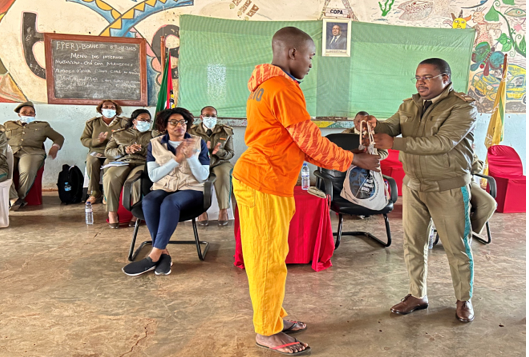“This place represents a second chance for me”: UNODC celebrates International Nelson Mandela Day in Mozambique with youth inmates and prison staff

Mr. Yazal de Viana Sousa, SERNAP Director of Inspections, hands over Mandela Rules trivia quiz prize to winner
Boane, 20 July 2023 – The global prison population has increased by 17 per cent since the start of the 21st century, with over 11 million people in prisons worldwide, surpassing the population of Greece, Sweden and South Sudan. At the same time, nearly one third of prisons in reporting countries operate over 100 per cent of intended capacity. Prison overcrowding negatively impacts the quality of sanitation, hygiene and health services and access to rehabilitation programmes, among other spheres of prisoner management. This undermines the very objectives of imprisonment: keeping societies safe and rehabilitating offenders.
In Mozambique, too, prison overcrowding remains a serious challenge in Mozambique, with the National Prison Service of Mozambique (SERNAP) running at 45,3% beyond its official capacity as of December 2022. Against this background, UNODC has worked closely with SERNAP to support its prison reform efforts.
UNODC in Mozambique commemorated the 2023 Nelson Mandela Day at the Penitentiary Establishment for Juvenile Recovery in Boane, a city west of Maputo, the country’s capital. The event, made possible by the generous funding of Norway, featured awareness-raising presentations on the United Nations Standard Minimum Rules for the Treatment of Prisoners. Also known as the Mandela Rules, these norms serve as the universally recognized blueprint for sound and humane prison management. The participation of the Director of Inspection of SERNAP at the ceremony, along with representatives from the Health, Women and Social Action district authority, reflects Mozambique’s active efforts to reform its prison system, which includes the recent approval of a Penitentiary Guard Code of Ethics and Conduct.
A young inmate shared his personal view on how prison rehabilitation programmes have impacted him explaining that once he is released, he aims to become an electrician and go back to school:
“I regret what I did that made me be here, but this place represents a second chance for me because I’ve learned a lot of new things here. We do plenty of activities, such as farming, and I’ve learnt to work with ornamentation. One of the most interesting things for me was to develop skills in working with electricity.”
Mr. Frederico Dimande, the spokesperson of the Penitentiary Establishment for Juvenile Recovery in Boane, also recalled the importance of the rehabilitation for the inmates, stating that “regardless of the fact that they have committed irregularities, they are human beings, and the only right that they lose is the right to freedom due to incarceration”, adding that the centre employs a number of rehabilitation tools, such as educational therapy and recreational and spiritual activities. “All this aims to help inmates return to society healed.”
The event also featured handovers of hygiene kits for inmates, building upon other UNODC initiatives, such as the installation of a prefabricated structure to serve as health care facility at this penitentiary centre in 2020. In fact, adequate access to health care services and to toiletries in prisons are key elements of the Nelson Mandela Rules. Considering that contagious diseases spread fast in prisons, and from there travel out to the wider community, prison health care services must be viewed as public health.
Prison reform, rehabilitation and social integration is one of the priorities of UNODC’s engagement, in line with Maputo Roadmap, the cooperation framework of UNODC in Mozambique endorsed by the government of Mozambique. A key initiative has been the Office’s support to Mozambican officials tasked with SERNAP’s forthcoming institutional strategy, which will address the need for improved health care services and increased rehabilitation, education, cultural and sports-related programs in prisons, among other initiatives.
As the guardian to the implementation of these and other UN crime prevention and criminal justice standards and norms, UNODC is mandated to support Member States in putting into practice these standards and norms by assisting States in building fair, humane and effective criminal justice systems for their populations as a whole.
UNODC will continue to support Mozambique in improving the conditions of its prisons, ensure the well-being of prisoners, and promote their successful re-entry into society in line with the Nelson Mandela Rules. Safe, rights-respecting and rehabilitative prisons reduce the risk of prisoners reoffending once returning to their communities, reducing criminality and keeping societies safe. Prisoners matter, on Mandela Day and every day.